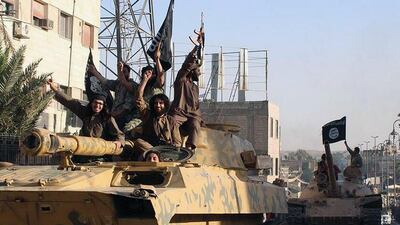Almost two months after the start of the coalition’s military intervention, ISIL maintains strongholds in Iraq and Syria. The bombings have, at least, slowed the jihadist group’s expansion and reduced their assets, but realistically these tactics have no prospect of destroying the group. Indeed, ISIL will use these attacks to fuel its propaganda offensive against the “crusader armies” and recruit more fighters.
When examining ISIL, it seems comparable to the GIA (Armed Islamic Group) in Algeria. Between 1991 and 1993, the group became one of the most prominent jihadist organisations in the world and plunged Algeria into a civil war that lasted more than 10 years and claimed some 150,000 lives. It proclaimed a “Khalipha” across localities of the plain of Mitidja, the communes of Greater Algiers, as well as in entire cities such as Lakhdaria and Medea. They called these regions El Manatik el Mouharara or liberated areas, governed them as a “parallel-state” with their own social programmes and applied Sharia strictly. Children were indoctrinated to denounce “un-Islamic behaviour” such as smoking, playing dominoes and listening to music.
Perhaps the most significant difference between the GIA and ISIL resides in the fact that the former’s actions did not cross international borders. In addition, the conflict did not involve foreign intervention. Notwithstanding these differences, the Algerian analogy remains pertinent as it provides insight on how the People’s National Army (PNA) engaged with this dangerous jihadist group.
The Algerian authorities focused on two main tactics: decay and infiltration. The army deliberately left entire regions in the hands of militias, surrounded them but did not actively try to dislodge them. Leaving these areas to rot, the army effectively catalysed the emergence of conditions adverse to the GIA. The ultra-violence of the “Kalipha” eventually unsettled the relationship between the extremists and their population.
The break finally took place in 1995 when the population organised a local “counter-resistance” through the formation of militia groups called “patriots” or “self-defence groups” under the protection of the army. By gradually losing the population’s support, the militias became isolated and relinquished control of territory to the army, which was buttressed by proxy militias numbering 60,000 fighters.
The government secured the loyalty of its militia by offering incentives, such as wages around three times above the minimum wage. Furthermore, the state undertook a youth recruitment policy.
The second strategy employed by the Algerian government, involved infiltrating the militias. The DRS (Department of Intelligence and Security) placed sleeper agents within GIA’s cells. After months, sometimes years of infiltration, some of these agents made their way up the ranks and could take part in decision-making. Some of them were so well integrated that it became near-impossible to distinguish them from actual GIA jihadists. Through this infiltration tactic, the sleeper agents contributed to the disintegration of the group from within.
Today, more than ever, the Algerian experience seems pertinent to ISIL. Applying strategies such as decay and infiltration are alternative solutions that would lead to the group’s eventual implosion.
Indeed, the combination of a repressive environment, a closed organisation and an anti-establishment structure will lead to a rise in violence that will eventually target the local population.
If left to rot, the areas currently under ISIL control will ultimately rebel against their occupiers. In fact, mobilisation has already begun in some regions, as evidenced by the formation of the Mosul battalion.
ISIL’s adversaries should build on these first islands of resistance as a means to convince the rest of the population to challenge the jihadists. Similar to the GIA example, isolating ISIL will profoundly affect its activities and gradually make it more vulnerable. Infiltration will do the rest by leading to a subsequent fragmentation of the group. This approach will eventually lead to the group splintering into factions.
Dalia Ghanem-Yazbeck is a research analyst at the Carnegie Middle East Center in Beirut

